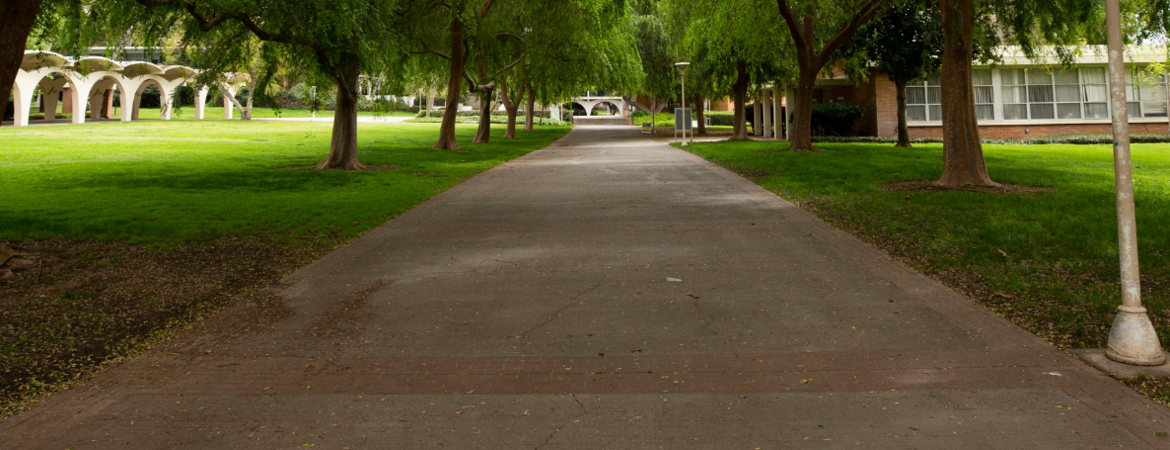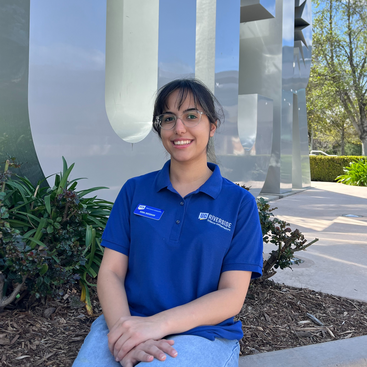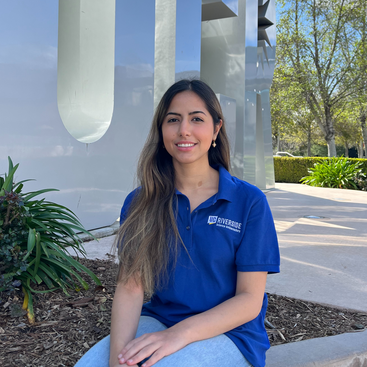
To say that twin sisters Assal and Sadaf Sadighian are used to long commutes would be an understatement.
The twins, who will graduate next spring with Biology degrees, live “a very short drive” away from campus, and will readily tell you that using Google Calendar is an immeasurable help in ordering their days and, metaphorically speaking, cutting that distance down even further.
But Assal and Sadaf’s real commute began a few years earlier and a world away in Iran. We asked them about what it was like coming to the U.S. as highschoolers, the ensuing culture shock, discovering UC Riverside and laying out pathways for their futures.
Tell us a little about yourselves.
Assal: "My sister and I immigrated to the U.S. with only a carry-on bag, a few thousand dollars, and with little to no background in English. When I first entered the U.S., I struggled with the long-distance relationship with my family and adapting to the different environment. It was challenging to find my educational path and learn a new language. I dropped out of high school to come to the U.S. without a diploma. I enrolled in adult school, obtained my GED, and enrolled in non-credit ESL classes for a year as I could not attend school due to non-resident tuition."
What other challenges did you face when you came to the U.S?
Sadaf: "When Assal and I were 17 and living in Iran, we received news from the U.S. Embassy about our visa status. My twin sister, my mom, and I were approved, but unfortunately, my dad was waitlisted. Despite this, our family decided to immigrate to the U.S. for a better future for my sister and me. After receiving the results at the Abu Dhabi Embassy, we returned to Iran to pack our bags and prepare for our flight. Meanwhile, the COVID-19 quarantine began. I remember hearing rumors of the disease while we were in Abu Dhabi, but I had no idea how severe it would become. Due to political tensions, there are no direct flights from Iran to the U.S., so we planned to travel through Turkey. However, the border to Turkey closed, leaving us with no other options. Our family searched for months for a solution. My sister and I had already dropped out of high school, anticipating an easy move to the U.S. Our visas were nearing expiration, and the chances of renewal were slim. Just as we were losing hope, we discovered a group traveling to Mexico City. There was no guarantee we could quarantine there or that the U.S. would approve our entry, but we decided to take the risk and went to Mexico with our mom for two weeks. Fortunately, it worked out."
Tell us about your initial transition to the U.S.
Assal: "When Sadaf and I immigrated to the U.S., we lived with our grandparents. None of our family members pursued medicine in the U.S., so it was challenging to figure out everything, but there was so much growth along the way. Before coming to the U.S., both Sadaf and I pursued professional swimming for 10 years in Iran and since then it has been a hobby of ours. Motivation is temporary, but my drive is rooted from envisioning the person I want to become and every day aiming to get closer to that person. Prioritizing and developing self-discipline has helped me to stay on top of my tasks."
What's your father's current status?
Sadaf: "I haven't seen my dad in a while, and my mom frequently travels back and forth between Iran and the U.S., which is costly. Although this situation is challenging, it has been my constant motivation to ensure that the long distance separating our family will be worth it in the end. I aim to make my parents proud, and I believe that my goals should be bigger than my obstacles. I saw this as an opportunity to become more independent. To that end, I have immersed myself in opportunities that will help me become a better physician and individual in the future. I was a Health Scholar for about three years at Riverside Community Hospital and participated in free clinics. Additionally, I have been involved in research. One way that Assal and I stay on track with our goals is by engaging in activities we are passionate about, which provides immense fulfillment and reminds us why we started this journey in the first place. Being a Science Ambassador, researcher, and volunteer has demanded a significant time commitment, so we always prioritize time management."
How has the College of Natural & Agricultural Sciences (CNAS) positioned you both for your eventual career paths?
Assal: "We believe that mentorship is essential for success in any career path. The principal investigator of our research, Dr. Garcia Castro, has taught us how to develop accurate laboratory techniques as well as how to navigate life challenges and see them as an opportunity to grow. In addition, we’re super grateful for medical students and physician faculties who have mentored us throughout my path and opened the doors to many amazing opportunities."
How has UC Riverside figured into your career tracks?
Assal: "During my gap year, I attended UC Riverside School of Medicine virtual open house and learned about the pathway programs offered by UCR School of Medicine, which excited Sadaf and me, because it seemed like the school had exactly the tools we needed to start our journey. Eager to become involved, we both applied and participated in the Future Physician Leaders Pathway Program, throughout which we learned about the resources and the amazing supportive community at UC Riverside. In addition, we both presented community health projects. Sadaf gave a presentation about Hypertension and Atherosclerosis and I presented a project on Insomnia and Sleep Deprivation to the community. Later on, we also participated in the Community College Outreach pathway program, where each of us got matched to a first-year medical student as a mentor – and that transformed our journey. The mentorship reaffirmed my outlook about a medical career and reinforced my commitment to pursue medicine. These experiences before even coming to UC Riverside made the university feel at home, so when transferring, without a doubt, I knew that UC Riverside would provide both my sister and me with the necessary resources to attain success."
Were there any challenges you both faced at UC Riverside? How did you overcome them?
Assal: "When I started my role as an undergraduate in research, it was a bit challenging to learn how to create a successful experiment and perform each step correctly. In lower division classes there was lab procedure and I just had to follow it. But in the research area, I had to figure out each step as I went, which increased my critical thinking. I learned how to take notes effectively and track my progress and set a specific description of what I would be doing each day in the lab which made it more efficient."
What classes/activities did you both like most or find the most valuable?
Sadaf: "Being part of the CNAS Science Ambassador community has given me countless new perspectives and invaluable learning experiences. I have come to realize that the effect and impact I have on people's lives bring me a deep sense of fulfillment and happiness. Serving as Co-President of the Science Ambassadors at CNAS is an honor and has been one of the most rewarding experiences of my college career. I also loved my time at Riverside Community Hospital, where I practiced patient bedside manners and taught other Health Scholars. This role allowed me to create health advocacy projects at the hospital and make a difference in patients’ lives. Additionally, serving underserved communities at free clinics has been a powerful reminder of why I chose this path and has strengthened my dedication to making healthcare accessible to all."
Assal: "I'm also deeply grateful for the chance to serve as a Science Ambassador. During one memorable campus tour, I met a family with a first-generation student. After the tour, I spent extra time discussing campus resources, financial aid options, and even shared my email for further questions. The students’ parents expressed relief, feeling reassured about the support their child would receive here. It was truly rewarding to make a meaningful impact. Also, my passion for teaching has been enhanced through my roles as a training coordinator at the COPE Health Scholars Program and as a Co-lead of Little Einsteins. These positions have allowed me to enhance my skills along with motivating elementary students to pursue higher education and teaching health scholars to deliver patient care skills while maintaining proper body mechanics and empathy. As an Iranian native, I observed widespread poverty and inflation causing food insecurity among my neighbors which affected their health. Experiencing these hardships in my native country and witnessing some of these inequities in my community in the U.S. sparked my interest in serving underserved communities. Being part of a free clinic has been a rewarding experience and I believe it is a human right to receive healthcare despite one’s income and housing status and so by being part of a free clinics I aim to fulfill that belief."
What is the best piece of advice you have for current and future students at UC Riverside?
Sadaf: "My best advice to current and future students at UC Riverside is to step out of your comfort zone. College is the perfect place to push your boundaries and discover your true potential. The limits we perceive are often self-imposed, and by challenging ourselves, we can achieve more than we ever thought possible and make a positive impact."
Assal: "One of my favorite quotes from David Goggin is, 'Do not stop when you are tired, stop when you are done.' Through hard work, dedication, and authenticity, anything is possible as long as you put your mind to it. Yes, adversity comes along the way, but set your goal to be bigger than your problems and that’s how you will succeed in life."
***
Sadaf and Assal have supported each other every step of the long and continuing journey that has taken them from Iran to eventual resettlement in the U.S. – not a novel concept, especially for close-knit twins. “We are each other’s support system,” Assal says, “from immigrating to the U.S. to coming to UCR. We ask each other questions and explain concepts to each other. Most of the time, we set up study time and report to each other.”
It shouldn’t come as much of a surprise then that the sisters’ joint career goal is to become physicians dedicated to making a positive impact in the Inland Empire; a case of two for one being two as one.
“We are committed to bridging healthcare disparities, advocating for patients, and advancing the idea of healthcare as a right, not a privilege, particularly in underserved communities,” says Sadaf.

